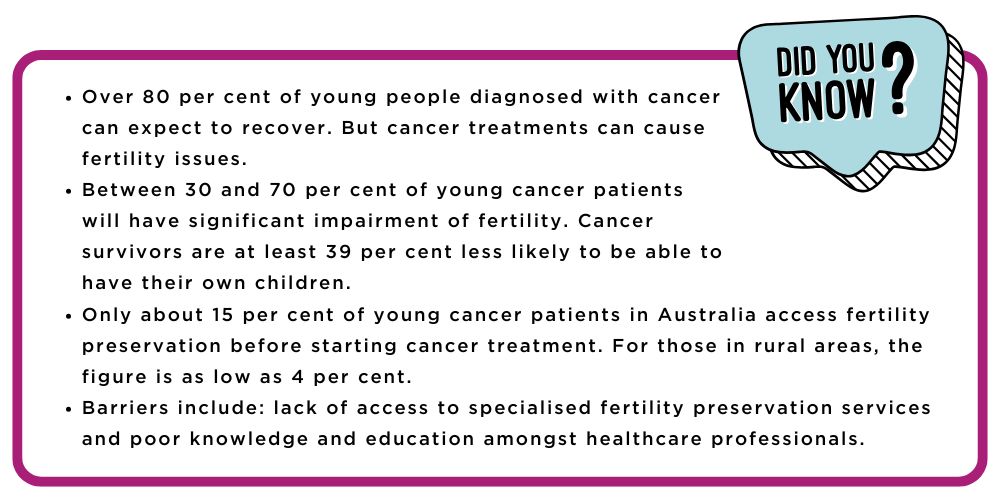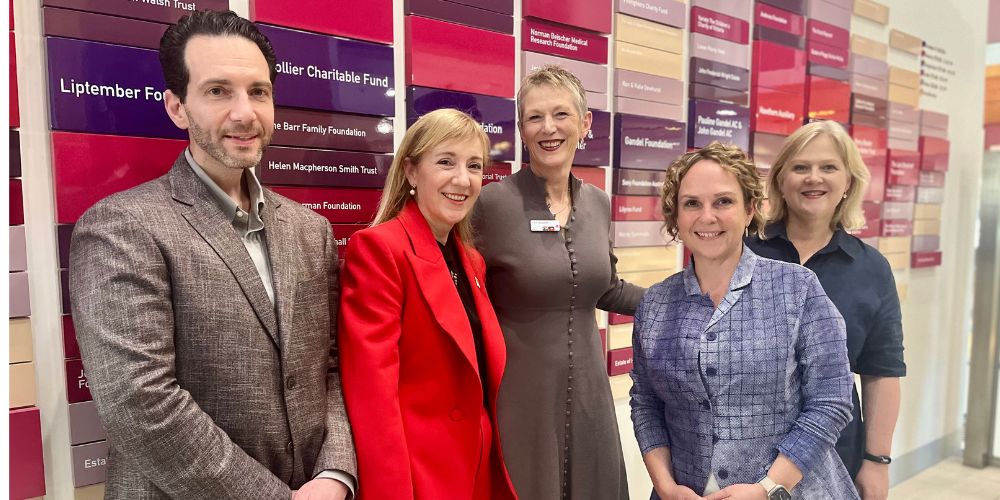
A new national initiative will bring hope to families affected by childhood cancers in Australia. Over the next five years, hundreds of children and young adults with cancer will be offered fertility preservation to start families of their own later in life, thanks to a landmark initiative launched by the Royal Women’s Hospital in Melbourne.
The initiative brings together the Women’s expertise and the support of visionary philanthropic partners, the Children’s Cancer Foundation and My Room Children’s Cancer Charity.
Backed by a historic $6.4 million funding commitment – the largest donation to the Women’s since its establishment in Parkville in 2008 – the national program will provide fertility preservation services, education, and research for young cancer patients nationwide. Thanks to the funding support, young cancer patients and their families can access these services free of charge.

Professor Sue Matthews, CEO of the Women’s, described the initiative as a transformative step in addressing a critical service gap for young Australians.
“We know that cancer treatments can have a devastating impact on fertility, and too many children, particularly those in rural and regional areas, have missed out on the opportunity to preserve their chance at parenthood,” Prof. Matthews said.
“Our new initiative changes that. We are thrilled and excited to give hope and optimism to these children and their parents – and are forever grateful to our philanthropic partners for helping to make this vision a reality.”
The national fertility preservation initiative is built on three key pillars:
- Education and training to support national service provision.
- A national ovarian and testicular tissue transport and cryopreservation service to expand access to fertility preservation.
- Research and development of cutting-edge technologies to improve fertility preservation outcomes for young cancer survivors.
Margaret Fitzherbert, CEO of the Children’s Cancer Foundation, said the Foundation is excited and proud to support this unique program that will benefit families throughout Australia.
“It aligns beautifully with the Foundation’s vision, that Australian children with cancer will have access to world class treatment and support to survive and thrive,” Ms Fitzherbert said.
“The Women’s exceptional people, expertise and track record make them the perfect partner.”

This notion is shared by Margaret Zita OAM, CEO of My Room Children’s Cancer Charity.
“We are delighted to be part of this program, which will have a profound impact on so many children and families across the country. This program is crucial in giving every child with cancer the best chance to survive and thrive, while continuing to support families on their journey and beyond,” Ms Zita said.
“It’s an honour to collaborate with the Women’s to deliver world-class care and meaningful support.”
Associate Professor Kate Stern AO, a world-leading fertility expert and Head of the Women’s Fertility Preservation Service, will lead the initiative. Fertility specialists Dr Genia Rozen and Associate Professor Wan Tinn Teh are appointed as co-directors.
Dr Rozen is particularly excited to address current research challenges.
“Fertility cryopreservation options and success rates are improving, but not yet optimal for young cancer patients,” Dr Rozen said.
“For patients with leukaemia and other blood-borne cancers, current tissue preservation/grafting techniques are not advanced enough to provide absolute reassurance that all traces of cancer have been eliminated and that the tissue is safe to graft back inside the body.”
Through the national initiative, the Women’s team of talented and world-leading researchers will focus on finding these missing puzzle pieces. Another focus is perfecting testicular tissue preservation and advancing In Vitro Maturation (IVM), as A/Prof Teh explains.
IVM is a cutting-edge technology that differs from conventional IVF by growing eggs in the laboratory that are not yet ready (or mature) for fertilisation.
“This cutting-edge technology is a particularly promising strategy to preserve fertility in children. Through ongoing research, we are keen to improve IVM success rates and broaden its application,” said A/Prof Teh.
Learn more about the initiative here: Fertility preservation for children with cancer | The Royal Women's Hospital